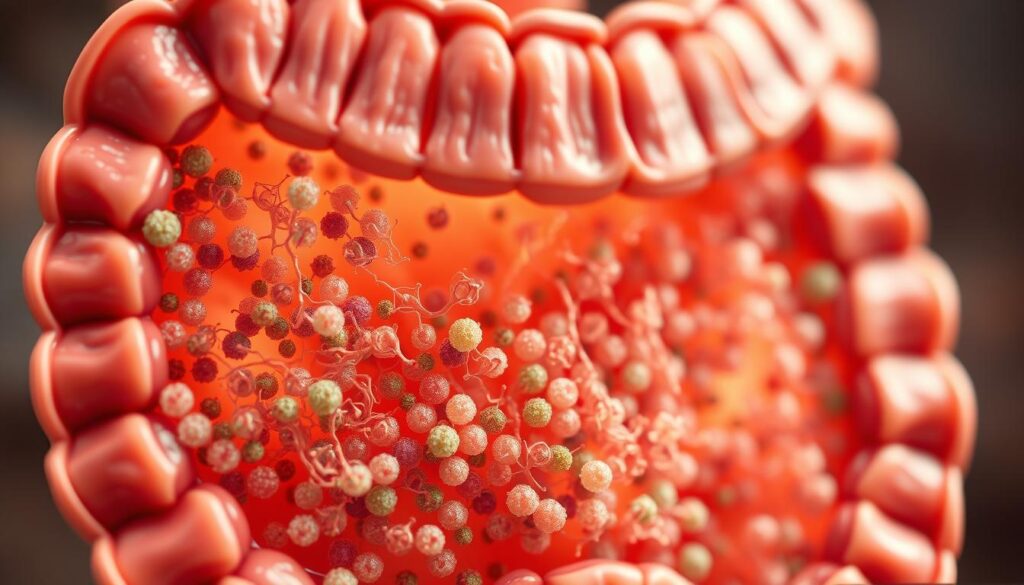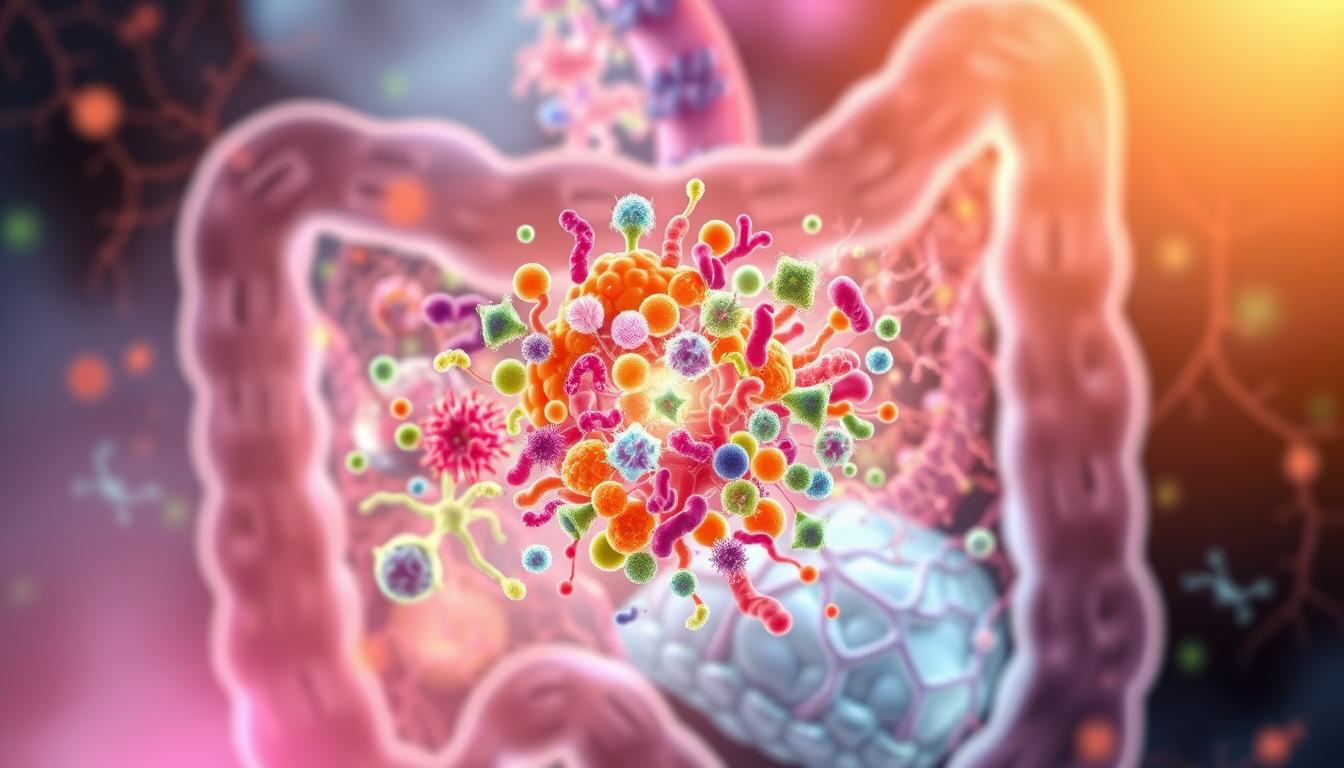Have you ever thought about the trillions of microorganisms inside you? Your body is a complex ecosystem that’s vital for your health. The delicate balance of your gut microbiome is key for a strong immune system, good digestion, and even your mood.
In this guide, we’ll explore why your gut microbiome matters. A healthy balance of bacteria in your gut is essential for well-being. We’ll look at the functions of the gut microbiome and how to support it for a healthier life.
Key Takeaways
- The gut microbiome plays a vital role in overall health.
- A balanced gut microbiome is essential for a strong immune system.
- Nurturing your gut microbiome can improve digestion and mental health.
- A healthy lifestyle can support the balance of your gut microbiome.
- Understanding the importance of microbiome health is key to maintaining overall well-being.
What Is the Gut Microbiome?
The gut microbiome is a complex mix of tiny living things. It’s found in our stomach and intestines. It’s made up of trillions of microbes.
Definition and Composition
The gut microbiome is a mix of bacteria, viruses, fungi, and more. Gut bacteria research shows it’s key to our health.
Some important parts of the gut microbiome are:
- Firmicutes and Bacteroidetes, the most common bacteria.
- Good bacteria that help with digestion and absorbing nutrients.
- Bad bacteria that can make us sick if they outnumber the good ones.
The Ecosystem Within Us
affects digestion and even our mood.
Important parts of this ecosystem are:
- The balance between good and bad bacteria.
- How the gut microbiome talks to our immune system.
- The impact of what we eat and how we live on our microbiome.
The Science Behind Understanding Gut Microbiome
Recent tech advances have let scientists dive deep into the gut microbiome. This has helped us grasp the complex interactions within it. We now know more about how it affects our health.
Recent Research Breakthroughs
Studies have shown the gut microbiome’s big role in health. It affects digestion and even our mental state. An imbalance, or dysbiosis, can cause health problems. Recent breakthroughs have found new bacteria and how they work with us.
Tools for Studying Gut Bacteria
Scientists use advanced tools to study the gut microbiome. Two key ones are genetic sequencing and metabolomic analysis.
Genetic Sequencing Technologies
Genetic sequencing lets researchers identify gut bacteria. They analyze DNA to see the types and diversity of bacteria. This gives insights into the gut’s makeup.
Metabolomic Analysis
Metabolomic analysis looks at what gut bacteria produce. It shows how these microbes affect our metabolism and health. By studying these products, researchers learn about the gut’s role in our bodies.
| Tool | Description | Insights Provided |
|---|---|---|
| Genetic Sequencing | Analyzes DNA of gut bacteria | Composition and diversity of gut microbiome |
| Metabolomic Analysis | Studies metabolic products of bacteria | Functional activity and influence on host metabolism |
Why Your Gut Microbiome Matters
Our gut microbiome is a complex ecosystem that plays a big role in our health. It’s key for digestion and supporting our immune system. A balanced gut microbiome is essential for our well-being.
Impact on Overall Health
A healthy gut microbiome is vital for overall health. It affects digestion, metabolism, and even our mental health. Studies show that an imbalance can cause obesity, diabetes, and mental health problems.
Signs of an Unhealthy Gut
It’s important to know the signs of an unhealthy gut. Symptoms can be digestive or not.
Digestive Symptoms
Digestive symptoms include bloating, pain, and changes in bowel movements. These can really affect our daily lives and comfort.
Non-Digestive Indicators
Non-digestive signs of an unhealthy gut include skin issues like acne and mental health problems like anxiety and depression. Even feeling tired all the time can be a sign. These symptoms show how the gut affects more than just digestion.
Keeping our gut microbiome healthy is very important. Here’s a table that shows what affects gut health:
| Factor | Impact on Gut Health | Examples |
|---|---|---|
| Diet | Influences bacterial balance | Fiber-rich foods, fermented foods |
| Lifestyle | Affects microbiome diversity | Exercise, stress levels, sleep quality |
| Environmental Factors | Can disrupt gut bacteria | Antibiotics, pollutants, certain medications |
The Development of Your Gut Microbiome
It’s important to understand how your gut microbiome develops. This process starts at birth and keeps changing as you grow. It’s a key part of your health.
From Birth to Adulthood
Your gut microbiome changes a lot as you grow up. At first, it’s empty, but soon it’s filled with microbes from your mom and the world around you. This early start is vital for a healthy gut.
Factors That Shape Your Microbiota
Many things shape your gut microbiota. These include your genes and the world around you.
Genetic Influences
Genetic factors shape your gut microbiome. Studies show that your genes can change the types and amounts of gut bacteria you have.
Environmental Factors
Environmental factors like what you eat and your lifestyle also matter. For example, eating lots of fiber helps good bacteria grow. This boosts microbiota diversity and brings gut microbiome benefits.
| Factor | Impact on Gut Microbiome | Example |
|---|---|---|
| Genetics | Influences diversity and composition | Genetic variations affecting gut bacteria |
| Diet | Affects growth of beneficial bacteria | Fiber-rich diet promoting beneficial bacteria |
| Antibiotics | Can disrupt balance of gut microbiota | Antibiotic use leading to dysbiosis |
The Gut-Brain Connection Explained
A growing body of research shows the gut-brain connection. This connection is a two-way street that affects our mental and physical health. It lets the gut and brain talk to each other, impacting our overall well-being.
How Your Gut Communicates With Your Brain
The gut and brain talk through several ways, like the vagus nerve and neurotransmitters. Knowing how they work helps us see how important gut health is for our minds.
The Vagus Nerve Pathway
The vagus nerve is key for gut and brain communication. It sends messages from the gut to the brain, affecting our feelings and thinking. Stimulating the vagus nerve can help improve our mental health, showing its big role in the gut-brain connection.
Neurotransmitter Production
The gut makes important neurotransmitters like serotonin and dopamine. These chemicals help control our mood, hunger, and sleep. The health of our gut microbiome affects how well these neurotransmitters are made, showing why a healthy gut is vital for our mental health.
Mental Health and Gut Health Correlation
Research shows a strong link between gut and mental health. People with mental health issues like anxiety and depression often have different gut bacteria. This has led to looking into probiotics for gut health as a way to help manage these conditions.
Important things to remember about the gut-brain connection include:
- The gut microbiota’s effect on neurotransmitter production
- The vagus nerve’s role in gut-brain communication
- The possible benefits of probiotics for mental health
Bacterial Balance in Gut: Why It’s Critical
Keeping a balance between good and bad bacteria is key for a healthy gut. The gut microbiome is a complex system that affects our health and happiness.
Beneficial vs. Harmful Bacteria
The gut is filled with trillions of microorganisms, both good and bad. Beneficial bacteria, like Lactobacillus and Bifidobacterium, aid digestion, make vitamins, and boost our immune system. But, harmful bacteria can cause inflammation, infections, and upset the gut’s balance.
Dysbiosis and Its Consequences
Dysbiosis, or an imbalance in the gut, can harm our health. It can cause inflammatory and metabolic disorders.
Inflammatory Conditions
Dysbiosis is linked to conditions like irritable bowel syndrome (IBS) and inflammatory bowel disease (IBD). These can lead to symptoms like stomach pain, diarrhea, and tiredness.
Metabolic Disruptions
An imbalance in the gut microbiome can also cause metabolic problems, such as obesity and insulin resistance. Studies show that people with obesity have different gut bacteria than those who are healthy.
| Condition | Effect of Dysbiosis | Potential Consequences |
|---|---|---|
| Inflammatory Conditions | Increased inflammation | IBS, IBD |
| Metabolic Disruptions | Altered metabolism | Obesity, Insulin Resistance |

Keeping a healthy balance of gut bacteria is vital to avoid these issues and stay well. By knowing how important gut balance is, we can support our microbiome through diet, lifestyle, and other methods.
Microbiota Diversity: The Key to Gut Health
The diversity of our gut microbiota is key to our health and how we fight off diseases. A diverse gut microbiome can do many important jobs for us.
A diverse microbiota makes our gut ecosystem strong. It helps us digest food, boosts our immune system, and even makes vitamins. This variety is vital for keeping our gut in balance.
Why Diversity Matters
A diverse gut microbiota brings many health benefits. It helps with digestion, strengthens our immune system, and supports our mental health. The different microbes in our gut work together, making our gut more resilient.
- Enhanced digestion and nutrient absorption
- Improved immune system function
- Production of certain vitamins
Measuring Your Microbiome Diversity
There are ways to understand how diverse your gut microbiota is. Tests look at the genetic material of the microbes in your gut. They give us clues about what’s in our microbiome.
Key aspects to consider when measuring microbiome diversity include:
- The richness of microbial species
- The evenness of their distribution
- The presence of beneficial or harmful bacteria
Diet and Your Gut Microbiome
What we eat greatly affects our gut microbiome’s health. The right foods can help our gut bacteria, while the wrong ones can harm it. This affects our overall health.
Foods That Nourish Your Gut Bacteria
Eating certain foods can help our gut bacteria grow. Foods high in fiber and fermented foods are key for a healthy gut.
Fiber-Rich Options
Foods like whole grains, fruits, and vegetables are vital for a healthy gut. They give beneficial bacteria the nutrients they need to thrive.
Fermented Foods
Fermented foods like yogurt, sauerkraut, and kimchi are full of live cultures. These cultures help populate our gut with good bacteria, boosting our gut health.
Foods That Harm Your Gut Microbiome
Some foods can harm our gut bacteria. Eating too much of processed foods and sugars, along with artificial additives, can hurt our gut health.
Processed Foods and Sugars
Eating a lot of processed foods and sugars can upset the balance of our gut bacteria. This can lead to the growth of harmful bacteria.
Artificial Additives
Artificial additives in many processed foods can also upset our gut microbiome. This can lead to health problems.
| Food Category | Examples | Impact on Gut Microbiome |
|---|---|---|
| Fiber-Rich Foods | Whole grains, fruits, vegetables | Nourishes beneficial bacteria |
| Fermented Foods | Yogurt, sauerkraut, kimchi | Populates gut with beneficial bacteria |
| Processed Foods | Packaged snacks, sugary drinks | Promotes harmful bacteria |
| Artificial Additives | Preservatives, color enhancers | Disrupts balance of gut microbiome |
Probiotics and Prebiotics for Gut Health
Probiotics and prebiotics are key for a healthy gut. They help keep the gut microbiome balanced, which is vital for our health.

Understanding Probiotic Supplements
Probiotic supplements have live bacteria that are good for your gut. They can fix the balance of gut bacteria after it’s been upset. It’s important to pick a probiotic that matches your needs and is made by a trusted company.
Natural Sources of Probiotics
You can also get probiotics from foods like yogurt and sauerkraut. Adding these to your diet supports your gut health naturally. These foods are not only good for your gut but also packed with nutrients.
The Role of Prebiotics
Prebiotics feed the good bacteria in your gut, helping them grow. They are usually found in foods like asparagus and bananas. Eating prebiotics helps your gut microbiome thrive.
Gut Flora Analysis: Should You Get Tested?
Gut flora analysis is a valuable tool for understanding gut health. It helps us grasp the complexity of the gut microbiome. By analyzing its composition, we gain insights into our overall health.
Available Testing Methods
There are several methods to analyze gut flora, each with its own benefits. It’s important to know these options to choose the best test for you.
Stool Sample Analysis
Stool sample analysis directly assesses the gut microbiome. It examines a stool sample to identify bacteria types and amounts. This test shows the balance between good and bad bacteria.
Breath Tests
Breath tests are another way to check gut health. They measure gases produced by gut bacteria. This can show specific bacterial populations or conditions like Small Intestine Bacterial Overgrowth (SIBO).
Interpreting Your Results
After gut flora analysis, understanding your results can be tricky. It’s key to talk to a healthcare professional. They can explain your results and suggest actions based on them.
Knowing your gut flora is a big step towards better gut health. By picking the right test and understanding your results, you can make smart health choices.
Gut Microbiome Benefits Beyond Digestion
The gut microbiome affects more than just digestion. It impacts our overall health in many ways. A balanced gut microbiome is key to keeping our body’s functions running smoothly.
Research shows the gut microbiome’s vast benefits. It supports our immune system and affects our metabolic health. This makes it a vital part of our well-being.
Immune System Support
Most of our immune system is in the gut. The microbiome is essential for immune function. A diverse and balanced gut microbiome helps our immune system by regulating the body’s response to pathogens and keeping the gut barrier strong.
As Dr. Mercola notes, “A healthy gut microbiome is key for a strong immune system. An imbalance can make us more prone to infections.” This shows how important it is to keep our gut microbiome balanced for immune health.
Metabolic Health and Weight Management
The gut microbiome also affects our metabolic health and weight. Research links an imbalance in the gut microbiome to metabolic disorders like obesity and type 2 diabetes.
A diverse gut microbiome is linked to better metabolic health. It improves glucose metabolism and insulin sensitivity. Certain gut bacteria can also affect fat storage, helping with weight management.
“The gut microbiota influences metabolic health by modulating glucose and lipid metabolism, and alterations in the gut microbiota have been linked to metabolic disorders.”
Understanding the gut microbiome’s benefits beyond digestion is important. It helps us see why maintaining a healthy balance of gut bacteria is essential. This knowledge guides us in making better diet and lifestyle choices for our health.
Conclusion: Nurturing Your Inner Ecosystem
Get The Best Probiotic Here
Keeping your gut microbiome healthy is key to staying well. Learning about your gut microbiome helps you make choices that support your health. This includes your immune system, metabolism, and overall well-being.
A healthy gut microbiome is essential. It means paying attention to what you eat, managing stress, and using probiotics if needed. Making smart choices helps create a strong and diverse gut microbiota.
By understanding and caring for your gut microbiome, you can greatly improve your health. This guide offers insights to help you on your path to a healthier gut and a better life.


